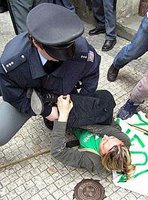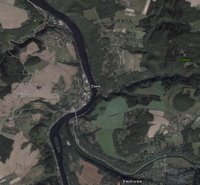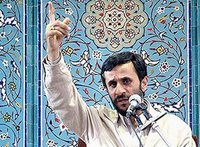 I don't often write Prague-specific articles here, but in the last ten days a pretty compelling story has highlighted some of this country's worst problems.
I don't often write Prague-specific articles here, but in the last ten days a pretty compelling story has highlighted some of this country's worst problems.
May 1st saw the usual round of celebrations, protests and counter protests here, including a Neo-Nazi demonstration, a counter-demonstration by anarchists, and a peaceful demonstration against the former. Obviously the police maintained a strong presence to keep clashes to a minimum.
Some distance from the head of the Neo-Nazi march, and the main fighting with anarchists, Kateřina Jacques, Green Party MP and head of the government's Human Rights section, was asked to stop demonstrating by a policeman. Jacques was there with her two small children, and a few colleagues. She refused. The policeman, Tomáš Čermák, ripped a banner out of her hands, roughed her up, handcuffed her, dragged her about 20 metres, and shoved her into a police car with his baton. In front of her children and friends.
The policeman was not alone, of course. His colleagues acted to try to prevent onlookers from taking photos, without otherwise trying to intervene. All of this was caught on film by a Britské listy correspondent (site in Czech). Ms. Jacques was taken to a police station for questioning, and was given medical attention some time later, after demanding to be taken to a doctor. Čermák was suspended, although he maintains he did nothing wrong.
Prime Minister Paroubek called the action "inexcusable", saying Čermák "probably acted in a moment of mental aberration". Similarly, Interior Minister František Bublan called the action "inappropriate", and said the officer would be sacked if it was found he'd abused his power. The Prague town police insisted the policeman had reason to act, but admitted they weren't sure if his actions were legal. Čermák's colleagues laid the blame fully on him, stating that all other aspects of the operation were perfect.
All of which leaves a nasty taste in the mouth. The fact is, we probably wouldn't be hearing about this quite so much if Jacques wasn't an MP. After similar claims of "inappropriate" action ended the CzechTek rave last year (held on legally-rented land), a flood of media attention ended with, well, nothing. All charges against policemen were later dropped, even though police action then was much, much nastier than in this case (see here, here, here and here).
In this case, politicians' instinct was initially to blame the policeman's mental state, either temporary or permanent. And the police authority's instinct is also to talk in such terms, although in their case they point to his 20-years' experience in the police, and the psychological tests required of entrants to the police. Yet what of his colleagues? Plainly no-one in authority over here wants to face up to the utter lawlessness of the police here. Reports from Amnesty International consistently point to police brutality as one of the countries' worst problems, and, as any expat here will tell you, corruption is rife.
To get an idea of the typical Czech reaction, I emailed a few friends for their opinions. Typical comments indicated it's 'normal' for police to act like this against leftist demonstrators (not politicians). Many respondees stated the police are too tolerant of neo-nazis and skinheads but crack-down on assorted leftists - "the police protect a neo-Nazi demonstration and beat up someone else." One thought that this case, and others preceding, are unique examples from unique events, but are not necessarily indicative of any further (day-to-day) brutality. A couple included cynical suggestions that, given the handy presence of a cameraman and the forthcoming elections, this whole episode may even have been fostered by Jacques purposefully.
Not one of my respected and intelligent friends and colleagues directly mentioned the need for reform, or offered suggestions for such reforms. This passive acceptance of authorities' failings seems a particularly Czech malaise not reproduced elsewhere in the region. This ingrained submissiveness probably results from dominance by outside powers lasting hundreds of years - Austro-Hungary, Nazi Germany, Soviet Russia.
Given this situation, it's unsurprising that nothing's being done. The investigation is focusing on a small number of low-level "bad apples". Only after more than a week of pressure was anyone vaguely senior dismissed - the Prague-2 region police chief and deputy chief. A couple of other policemen have been punished, including the deputy chief for Prague and the commander of Čermák's unit.
It's unlikely the blame will spread further. The investigation is being run from the Interior Ministry's agency. Nothing like the UK's Independent Police Complaints Commission. Given that the Interior Ministry is responsible for the development of the police, don't expect any self-flagellation soon.
This country needs real reform. Getting rid of some bad apples doesn't change the mouldy box. For starters, police complaints should be investigated thoroughly by an authority completely independent of the police and interior ministry. Once institutional failings have been identified they can be addressed by comprehensive reforms. That will take time, perhaps a generation or more, but is absolutely imperative for a modern-day police force.
For such an independent complaints authority and subsequent reforms to succeed, the culture of corruption and police untouchability in day-to-day life must be addressed. Yet a prior requirement is for the Czech public en masse to take a firm stand against outrages, not merely to put up with it. Hopefully future generations, under liberal democracy, will develop the confidence to make such changes. I don't expect real, effective change for the foreseeable future. rickphillipsuk
 I'm just recovering from setting the trail ('haring') Sunday's run for the Hash House Harriers. It was a great trail, if I say so myself, heading from Měchenice, via Sloup and Davle, to Pikovice, taking in some great scenery from forests and streams to hilly vistas including the Vltava river and Sazava tributary. The trail is set by leaving blobs, lines and circles of flour on the ground.
I'm just recovering from setting the trail ('haring') Sunday's run for the Hash House Harriers. It was a great trail, if I say so myself, heading from Měchenice, via Sloup and Davle, to Pikovice, taking in some great scenery from forests and streams to hilly vistas including the Vltava river and Sazava tributary. The trail is set by leaving blobs, lines and circles of flour on the ground.
After the trail was set, my co-hares (Tamaron and Valentina) and I were too knackered to even make it back to the beer stop at Sloup to meet up with the runners, so we had a nice relaxing wait in Pikovice. It had taken us four hours, during the hot hours of the early afternoon.
The runners seemed to have enjoyed the run, and of course, gave us punishment drinks ('down-downs') for setting such an awful run, and for not even attending it. The traditional obscene songs were sung with spirit. Unfortunately I'm the usual 'hash flash' (photographer), and since I didn't do the run after setting the trail, there are no photos of the absolutely stunning countryside we went through. Ah well. I've marked the route on a satellite photo from Google Earth - you'll have to click on the image above to see it.
 Time for an update on Iran, which continues to dominate the news, with their successful enrichment of uranium and the UN Security Council's deadline (28 April) for Iran to halt enrichment, as assessed by an IAEA report.
Time for an update on Iran, which continues to dominate the news, with their successful enrichment of uranium and the UN Security Council's deadline (28 April) for Iran to halt enrichment, as assessed by an IAEA report.
An additional offer from Iran to re-allow IAEA inspectors into the country, with a timetable for inspections to be drawn up in the next three weeks was unsurprisingly rejected by US Secretary of State Condoleezza Rice as "playing games", while Colin Powell attributed Iran's intransigence as an acceptance that they can withstand any likely sanctions over the issue. Actually, the two views aren't irreconcilable, as suggested by the IHT (previous link): Iran may feel able to withstand the possible sanctions, but would still prefer to delay them as far as possible.Regardless, Russia and China still look likely to veto any Security Council resolution imposing sanctions on Iran, with Iranian Foreign Minister Manuchehr Mottaki confident enough to announce this to the media. It's unusual for a foreign minister to comment on the supposedly secret foreign policies of other states, yet Russia and China seem to have forgone complaining about this, and have indeed resisted sanctions. The reasons for this seem to centre around fears of an ultimate American military action resulting from a resolution under Chapter VII of the UN, with Iraq still firmly in foreign-policy-makers' thoughts. Other considerations may include worries about disruption to oil markets and supply (China) and rather outdated perceptions of geopolitics and economic ties to Iran's nuclearisation and military development (Russia). In addition, I'd be tempted to attribute at least a small part of the support to the desire to follow a Middle-Eastern policy opposite to America's.Mark Heinrich provides a solid analysis of Iran's perspective on this issue in an excellent Reuters article. Particularly worrying is the possibility that Iran may try to replicate their success enriching uranium at Natanz at other sites, underground and unknown, and the possibility that Iran could depart from the Nuclear Non-Proliferation Treaty (NPT), becoming only the second country (after North Korea) to do so. Heinrich emphasises Iran's pride and need to feel secure, as well as their genuine feeling that they are being denied their right to civilian nuclear power. All of this, in Heinrich's view, suggests that the only way out without war or a nuclear Iran is diplomatic engagement by the US. A noble hope, but I'm far too cynical to expect it anytime soon. Heinrich draws a parallel with North Korea, and while the two countries have similar security fears, North Korea's history of nuclear developments show an intention to use them as bargaining chips, while Iran's actions indicate a desire for the bomb itself.Reports this week claimed Iran had received a batch of 18 BN-25 missiles, developed from the Soviet SS-N6 supplied to North Korea after their decommissioning in Russia (see here). The missiles, ordered in February, have a range of over 1,500 miles, a significant improvement on Iran's Shahab-3 and Shahab-4 (in development) missiles, leading some analysts to speculate that the Shahab-3 will be phased out and work on the Shahab-4 will be halted.Israel, probably the one country most troubled by the prospects of a nuclear Iran, launched a spy satellite from Russia to monitor the country, later applauding the satellite's excellent picture quality. Meanwhile, an Iranian Revolutionary Guards commander stated that Israel would be the first target for retaliation in the event of an American attack.Unsurprisingly, the confrontation has pushed up the price of oil even further, to 75$. Although Iran has pledged not to further disrupt supply as a political tool (that would be cutting off its nose to spite its face), deputy oil minister Hadi Nejad-Hosseinian did suggest that prices may rise to 100$ per barrel as a result of the confrontation.Essentially, Iran knows America's weaknesses, has guessed at the consequences, and decided to push for nuclear weapons. Both America and Iran are talking tough, but Iran seems to be holding most of the cards, with American diplomats lacking the support needed for a tough line, the American military tied up in Iraq and the American public less inclined to support future excursions.Still, Iran will still take a good few years to perfect their enrichment techniques, and will then take at least another year to enrich enough uranium for a bomb in the worst-case scenario (or if you're Iranian, best-case scenario). That would be followed by a period developing, and ultimately testing, a nuclear warhead. And if that happens? American claims that the world won't tolerate a nuclear Iran are somewhat unfounded. The world already has an "Islamic nuclear bomb" (Pakistan), and an "evil rogue state" probably with a bomb (North Korea). Iran's bomb might just add some welcome stability to the region (see here), with extra caution in regional diplomacy and enough security and confidence for Iran to foster greater ties in the region.
Need I mention India and Pakistan? In July 1999 what seemed an inevitable re-run of the conflict over Kashmir was averted, with lots of nervous consideration of the nuclear consequences. Now there seems to be a new bus route between the two every few months, with confidence growing and prospects of a settlement of Kashmir still distant, but definitely rosier.Although Iran has no rivalry as obvious as India and Pakistan, it has regional rivals (Israel, Turkey, Iraq) who could either put up enough of a fight to deter Iran, or who have friends who would be happy to do so, whether politically or militarily. Any likely sanctions from the actual use of a nuclear warhead would undoubtedly have the support of of the UN Security Council. Isolation, if not outright destruction, is not in Iran's interests, and they know it. While the bomb could have its advantages in terms of peace and security, its potential costs are as massively more unlikely as they are horrifying.
The military approach to preventing Iran's program is fraught with difficulties and potentially massive repercussions. Diplomatic engagement leading to a permitted civilian program would be the best solution, but forgoing that, I'd prefer a nuclear Iran to a horrible mess any day.
 I don't often write Prague-specific articles here, but in the last ten days a pretty compelling story has highlighted some of this country's worst problems.
I don't often write Prague-specific articles here, but in the last ten days a pretty compelling story has highlighted some of this country's worst problems.
